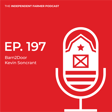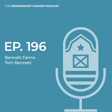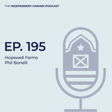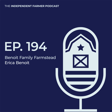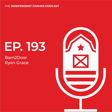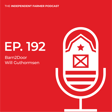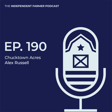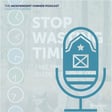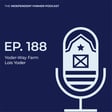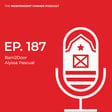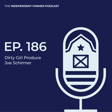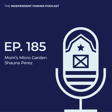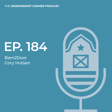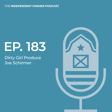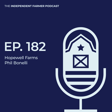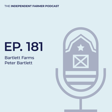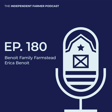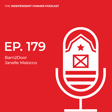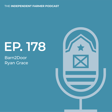Become a Creator today!Start creating today - Share your story with the world!
Start for free
00:00:00
00:00:01

How to Make Friends & More Money Selling Local Food
Rally with your Farm Friends to Sell More, Make More and replace Bad Food & Big Ag. Learn how Josie form Dan & Debbie’s Creamery partners with other Local Farmers to Replace the Grocery Cart for a Win-Win!
Transcript
Introduction to the Podcast
00:00:10
Speaker
Hello and welcome to the Independent Farmer podcast, the go-to podcast for do-it-yourself farmers who are taking control of their own business, skipping the middleman, and selling direct to local consumer and wholesale buyers.
00:00:20
Speaker
This podcast is hosted by Barn to Door, the number one business tool for independent farmers to manage their business, promote their brand, and sell online and in person. Let's dive in to today's Independent Farmer podcast.
Meet the Host: Corey
00:00:42
Speaker
Welcome to the Independent Farmer Podcast. I am Corey and I'm on the success team here at Barnador and your host for today's episode. Just a little bit about myself. I'm a farm account manager here at Barnador. My day-to-day is meeting with our current farmers, helping from everything from their farm store to email marketing. I have a lot of just marketing brainstorms in general, sharing strategies on growing your customer list and driving more potential customers to your farm store and doing the podcast is just one of the great opportunities I'm afforded and I love
About Barn to Door
00:01:21
Speaker
doing it.
00:01:21
Speaker
So as many of our listeners may be aware, Barn to Door offers an all-in-one business solution for independent farmers who are cutting out the middleman tax taking control of their business, selling under their brand, and making sure their customers can purchase from their farm, both online and in person. In today's conversation, we will get to expanding the cart with farm partnerships.
Guest Introduction: Josie from Dan and Debbie's Creamery
00:01:43
Speaker
Today, I'm happy to welcome back Josie of Dan and Debbie's Creamery in Iowa,
00:01:49
Speaker
Josie is a part of our Farm Advisor Network and has worked with us for five years. And since becoming an advisor, has shared her knowledge of marketing to local buyers, mastering delivery day, and utilizing local partnerships. I'm excited to talk to Josie about farm partnerships, expanding her inventory with local products, and how to make their farm store a one-stop shop.
00:02:12
Speaker
With that said, welcome Josie. Thank you. I'm so excited to be here. Awesome. And I know Josie a little bit. She also hosts our social media academy and I've been lucky enough to co-host or more so proctor that. So been in many of those sessions with you. Yes, I love the social media academy. All things marketing, that's kind of my bread and butter. It's one of the things I enjoy doing most for our family business.
00:02:36
Speaker
I'm so excited to be here and to dive into how we partner with other local farms. Yeah, and this is going to be a great topic. This is something a lot of farms ask me about, so I think this is going to be extremely helpful.
00:02:49
Speaker
But before we get started here, Josie, can you just give a little bit of background for any new listeners or people who may not be familiar with, you know, what your farm is, what Dan and Debbie's Creamery is, how'd you guys start, what products do you produce?
00:03:04
Speaker
Yeah, for sure.
History and Operations of the Creamery
00:03:05
Speaker
So my parents are first-generation dairy farmers, and they started milking cows. We're approaching 30 years um ago, and I remember growing up on the dairy farm, my dad always toyed around with the idea of being able to sell our milk direct to consumer. And this was an idea and a dream that didn't happen overnight. It took about 15 years before we started exploring farm-to-table processing and being able to be involved in the whole process from farm-to-table.
00:03:36
Speaker
And 10 years ago, we're approaching our 10th year of being open at the Creamery. We finally renovated an old building in our small town of Ely, Iowa, turned it into a modern-day processing facility, and started making dairy products with the milk from our family farm. So we have 120 dairy cows, and we bring milk over to the creamery every week. And we make things with bottled milk, make cheeses, ice cream, butter, and we sell direct to consumer out of our store. We also have a robust home delivery service that we offer and we sell to a lot of wholesale partners. But one of the things that I'm most proud of over the last 10 years with our business is really just growing our retail store, people coming right to the site where we're making the products.
00:04:19
Speaker
And we sell all of our products there, but then we also partner with a lot of other local farmers and sell a lot of their products as well. And so it's just really cool to see customers come in and be able to source their groceries and foods locally. And it's a really special thing for our family to experience and to have that relationship with customers.
00:04:36
Speaker
That's amazing. Yeah, it's a unique deal and doesn't sound like any of this happened overnight. Nope, certainly not. Awesome. Well, tailoring off that, how is your farm store set up? Can you give us a little bit on just what products you guys offer, whether that's in person, online or both?
00:04:56
Speaker
Well, when we first started 10 years ago, we had a retail space and we knew we wanted to sell our own dairy products in, but it was always really challenging to get people to come out just for their gallon of milk or just for a pound of butter or cheese. So many people live in a world where they can get more items and our store was
Expanding Product Offerings
00:05:16
Speaker
large enough where we could accommodate other products outside of the products that we were making. And so we really started selecting products that we wanted to sell in our store that were complementary to the products that we were selling. So for example, um we make butter and a really complementary product to butter is honey or jam. And so we started sourcing local honey and local jams and trying to bring those into our store. And we found that those complementary products helped sold each other, which was a really powerful thing. Then we just started expanding into other local businesses. And today i don't really do much outreach for
00:05:53
Speaker
bringing in products to our store, we get people who come to us every day saying, hey, would you consider selling our products? And we explore if the relationship is worth it. It's just been a really great, great thing for us to be able to offer customers, but also great for the partnering farmer to be able to have a space to sell.
00:06:11
Speaker
That's very interesting that it has evolved to the point where now people are approaching you. In the beginning, though, how did you determine how you were going to source other products? What were the things you were looking for or were that were key aspects of what made up a partner or potential partner?
00:06:27
Speaker
Yeah, great question. So for us, there was one really important criteria, and that was that we wanted them to be a local small business. We wanted to make sure that they were Iowa made, so produced within our state, and we wanted it to be a product that of farmer made from start to finish. We didn't want it to be mass produced at the time. We really just wanted it to be a simple way. We also looked for vendors and partners that didn't have another outlet for sales, meaning they didn't have a storefront themselves, or they were running into issues where they just didn't have the space or maybe the resources. And so we wanted to be
00:07:06
Speaker
come a hub and a home for them. That was how we started. But then as we continue to grow, we expanded our reach a little bit and we just wanted to make sure that it was a product that we love. We feel like our brand has built a lot of trust among our consumers. And so a lot of the reason why people come into our store and buy our products is because people trust that we're selecting really special products that are made really well and are basically just quality products.
00:07:35
Speaker
Gotcha. That makes total sense. And a question I get a lot from farms who maybe they only have one core product. They're just doing beef or their dish doing poultry. So they're starting to think about whether it's selling someone else's products in their store or getting their products in someone else's store.
00:07:52
Speaker
How is that deal structured? Like, is it something super formal? Is it ah handshake agreement? Can you shed some light on
Vendor Partnerships and Models
00:08:00
Speaker
that? Sure. I've talked to some farmers that do it both ways. so For us, it's a little bit more of a handshake. We don't have any formal contracts or anything like that. My goal with selecting farmers or producers that I want to work with is that we're benefiting them and they're benefiting us. We want this to be a true partnership, not something where I'm buying their products, but it's not selling in my store or vice versa. We want this to work
00:08:25
Speaker
for both people. And so for us, it's really just finding farmers who are willing to work with us, who want an outlet to sell their products, who are willing to keep it fairly informal. And hopefully in turn, we sell some products for them. The two ways that we operate our products partnerships with other farmers are on consignment and then completely resale. So a consignment vendor is a vendor who offers a product that is a little bit more risky for us to partner with. Maybe it's a product that's either super expensive for us to buy and resell, or it's a product that a lot of consumers aren't familiar with. And so it's going to be a harder sell for us.
00:09:06
Speaker
So those vendors, we generally operate on consignment, meaning that they get space in our store and we sell it and whatever we sell, they get a percentage of and we get a percentage of after the sale is already made. Our resale customers or partners, those are ones where we buy it at a wholesale price from them and then we resell it at a price. So I'm buying it from them in advance,
00:09:30
Speaker
and selling it all. So those are two different kind of models that we go with. We have about 20% of our vendors and partners in our store that we do consignment on, the other 80 I'm buying resale. This has changed drastically since we started. In the beginning, we had a lot more consignment vendors because of the risk, because we didn't understand sales, because we weren't sure what our customers were gonna like. It's since pivoted because we just have such a better understanding of what's gonna sell and how much is going to sell from week to week.
00:10:01
Speaker
Okay, that makes sense. I imagine in the beginning, and you still to this day, probably want it to be something that kind of aligns in a certain way with your core business of doing dairy products, milk, eggs, butter, cream, ice cream. So is there limitations to, you know, you would get approached by someone and it's like, no, that just doesn't fit. Does it have to be local in Iowa?
00:10:26
Speaker
Yes. Right now we're all Iowa made. We have had talks about maybe expanding that just because there are some products that we want to bring in that we haven't been able to find an Iowa farmer or producer or baker to fill that need. An example for us, we make cheese and cheese and crackers go great together, but I have not been able to find a vendor within the state of Iowa that makes crackers. And so we're exploring, well, maybe we branch out a little, but that is one big criteria right now that we want them to be an Iowa made producer. The other stipulation that we have is we do not want to have a bunch of the same vendors. There's lots of different honey businesses out there in the state of Iowa.
00:11:08
Speaker
We just select one because we don't, unless they provide a different product or a different offering that we're interested in, we don't need a shelf full of honey. One honey is enough. So again, we are a small store. We're not going to have tons of different brands. We try to just keep it to one per type with the exception of a few, if there's some different flavors and things that we want expand. But for the most part, keeping it simple that way is important.
00:11:33
Speaker
Okay. And on the other side of the coin, we've talked about partners you are incorporating into your own store. I know being familiar with your online store and your website that you also feature where consumers can find your products in other places, groceries and other retail
Building Wholesale Relationships
00:11:51
Speaker
spaces. How did those relationships begin?
00:11:55
Speaker
Yeah, I kind have two different directions to go with that question. Number one, so yes, we do partner with a lot of grocery stores and coffee shops, restaurants, things like that with the products that we make at Dan and Debbie's Creamery. Those partnerships really have grown over time.
00:12:11
Speaker
um When we started 10 years ago, it was a lot of grassroots marketing, walking into grocery stores, having a wholesale buyer's guide that i presented with them, presented to the deli manager or the dairy manager. i would give them samples of our product and try to get on their calendar to meet.
00:12:28
Speaker
Those were challenging days because you're really just trying to hit every store, making all of the sales. I remember that time period just being grinding all the time. Go, go, go. Now we are at a point 10 years into our business where we don't have to do that near as much. People are coming to us, which is just so amazing. I don't know that I do a ton of outreach at this point anymore to do our wholesale business sales because people are coming to us, which is fantastic. But I still provide them with a wholesale buyer's guide. I'm still giving them samples and trying to tell them how we're different and things like that. So that's kind of how that side of the business works.
00:13:07
Speaker
When we work with other businesses, we don't sell any of our farmer partner products. We just are distributing our Dan and Debbie's products. via wholesale. Our farmer partner products are primarily resold by us directly to the consumer. So in that vein, when we started home delivery five years ago and started working with Barn to Door, we created our online store.
00:13:31
Speaker
And at first we got all of our products populated on the store and we were delivering milk and eggs. We also partnered with an egg farmer and started selling eggs. And so many people had visited our store and they're like, I you really want to get that ground sausage, or I wish you guys had bacon or all of these other products that they could come get in our store. And I thought, you know, why not add them to our online store and give people that ability to start buying more. And so over the course of time, we slowly started adding more and more farmer partner products onto our online store. And a lot of our home delivery customers are not just getting a gallon of milk every week. They're adding on bacon, yogurt, sweet spring mix, you name it. And it's helping to make each transaction higher for us, which makes each stop more worth it, which is really great.
00:14:20
Speaker
Yeah. And I think something you said is key for a lot of the newer farms or just starting out. It's important to note that this wasn't an overnight thing. You touched on the fact that you were going in person with your wholesale relationship, you know, binder and having to really grind it out. So for newer farms, like How do I get my foot in the door? That's a question I get. Do I go in person? Do I call, email? What do I say?
00:14:48
Speaker
So what would be your advice for those farms? Don't be afraid to go into the stores. I remember i had fears early on. What if I get turned down? I didn't want people to say no to this product that my family has worked so hard to produce. It was kind of a gut punch every time someone said no. It is hard, but you just have to keep going and you're going to get so many more yeses. And I feel like those no's that I got early on from different restaurants or grocery stores,
00:15:19
Speaker
actually helped me deliver my presentation better in the future. i was able to prepare in a different way. And I kept it simple. I feel like so many people just send an email and if they don't get a response, well, then they're not interested. I don't think that is the correct approach when you're wanting to work with a business. I think stopping in dropping off a wholesale buyer's guide that tells your story and offers pricing with some samples is the way to go. You don't need to ask to meet with them because I'm a big believer in like, don't expect somebody to give you 30 minutes of their time. Just drop it off, introduce yourself and say, I would love to talk to you more about this. If you drop off a sample and your product speaks for itself, you're likely going to get a phone call in a few weeks.
00:16:06
Speaker
And then I do check back in a reasonable amount of time. I'm not a naggy salesman. And if somebody says no to me, I move on to the next one now. It's no offense. It's not always going to be a good fit for businesses to work with us. And that's okay. The door will open on the next one and we'll just try to get that one. So keeping positive, not getting too bent out of shape and just being willing to show your face to the potential customer, I think are really important things that farmers need to be willing to do.
00:16:34
Speaker
Yeah, so many of the best things are a result of getting out of your comfort zone, which I know in conversations for a lot of farmers and what you're saying is you may have to leave the farm and you may have to be okay with hearing no, right? Which sounds like it was a huge part of it for you and just building up that acceptance that it's going to be a little bit of a grind.
00:16:55
Speaker
All right, well, going back, Josie, you touching on what you're featuring in your barn-to-door store and In your store, I know a huge aspect for online sales now we're talking specifically are your milk subscriptions, your egg subscriptions.
00:17:11
Speaker
How do you think those subscriptions have benefited from having additional products from other producers or partners as add-ons or just how has that benefited your farm?
00:17:23
Speaker
Can you just talk a little bit about subscriptions and pairing with partnerships?
Enhancing Subscriptions with Add-ons
00:17:28
Speaker
Yeah, we really only have two different types of subscriptions. It's milk and eggs.
00:17:35
Speaker
We did recently add whipping cream, which I throw in our milk category. But those are the only subscriptions that we have because those are the things that people want consistently every single week. So those are on a weekly basis. Consumers can get those. Everything else in our farm store online is a la carte.
00:17:55
Speaker
So those don't come automatically every single week. Customers need to go in and buy them. So we were very strategic on which items we made subscriptions versus which items we made a la carte.
00:18:08
Speaker
Customers who are subscribers, I would say at least 60% of our milk subscriptions add on items every single week. So it might just be one item. It also might be 10 items. It really just depends.
00:18:23
Speaker
But having that on the docket as an offering takes a $6 gallon of milk delivery all the way up to a $50 transaction just by them having the opportunity to add on other items. And it's super, super helpful for us to be able to do that. One subscription that we're exploring adding is a meat subscription that would run on a monthly schedule because we realize that we're selling a lot of frozen meats. We offer a ground beef that we raise and sell, but we also bring in another producer's ground pork, bacon, brats, you name it, lots of different meat offerings. And so adding that subscription, I think can drive sales.
00:19:06
Speaker
But ultimately, when I think of marketing and subscriptions, my goal is to try to get every subscriber. They're locked in weekly. They're going to get their milk. But how can I get them to spend more with us so we can make that transaction higher every single week. It doesn't happen every single week, but the bulk of the weeks are.
00:19:25
Speaker
One other thing I want to know is outside of our subscribers, customers can order any of our items a la carte. So maybe somebody doesn't want milk every single week, but they really want to get a bunch of cheese and meats and yogurt and stuff maybe once a month or as needed.
00:19:42
Speaker
Customers can order la carte and get any of our products. And just this last week, I had a handful of customers get our bulk beef boxes, ground beef boxes. So they're getting cases of 10. So it's a great way to allow people who maybe don't want your subscription, but still want to buy every once in a while to get those new people to order and make some sales.
00:20:04
Speaker
Yeah. I mean, 60% of subscription customers adding on is a pretty incredible number, but it makes sense to like getting your foot in the door with that subscription and you're already going to that person's house to do a delivery and you're already alleviating one thing they have to get from the grocery store by doing that milk delivery. But having ground beef, eggs, all these as other essential items.
00:20:28
Speaker
I'm sure that just makes sense for you. It increases your average order size. It makes sense for the customer. And you touched on this a little bit. in terms of trying to encourage add-ons from current subscribers, but how does the marketing aspect of it work when you are partnering with other farms and featuring things in your store?
Power of Email Marketing
00:20:49
Speaker
You lead the Social Media Academy. Are you posting about these other products, the ground beef, the beef sticks, or anything else you're promoting in your store? Are you expecting your partner to do some marketing as well and drive people to your store?
00:21:03
Speaker
Yeah. So i mean, we within our Dan and Debbie's Creamery retail space, we are promoting all of our vendor products, all of our products, ice cream flavors, you name it on our social media page daily. We are posting daily different offerings we have based on the seasons or just what we have a lot of. We want to make sure that people know what they can get when they come to the Creamery.
00:21:29
Speaker
In terms of the online store and specifically home delivery, one of the most successful tools that I use to help get people to add on to their subscription or just place a large order of products is email marketing. And I do that two ways. So all of my subscribers Get an automated email. It's just the generic email through barn to door. It's an order reminder that goes out every Friday morning.
00:21:57
Speaker
Their cutoff for their following week delivery is Friday afternoon. And so Friday morning, it's right in their inbox. They know i have till noon and they will urgently place their orders. So on Friday, I can almost guarantee that my inbox is going to get dinged a lot with online orders because that reminder is going out. So getting a reminder, ah simple email reminder out to all of those subscribers is going to help drive each transaction significantly. Another tool that we use is MailChimp.
00:22:28
Speaker
We send emails to our home delivery customers with different product offerings and things that we think they might like that are seasonal. or are really popular this time of year. For example, the one that I have going out this week is going to feature some pumpkin donuts. We just got apple cider in the store. I'm going to promote some of our ice cream flavors that are really fall inspired, like pumpkin spice, salted caramel, apple crisp.
00:22:54
Speaker
Those are all things that I'm going to throw into this email messaging. I might also do so two products that complement each other. So yogurt and granola. So I'm putting these ideas in people's heads of things that they might enjoy. And from those ah emails that go out, they all of a sudden are like, I need to go and place my order for the week. They'll click. A lot of times they're buying the stuff that's in that email. And many of the time they're adding on additional things. So those are two really powerful ways that we utilize email marketing for our sales.
00:23:27
Speaker
You're preaching to the choir on this and email marketing is something I talk to farms about every single day and almost every single meeting. And you've referenced automated order reminders, which is such a low effort, a powerful tool to hit someone's inbox again and remind, especially, you know, you group a subscription customer, let them know their subscriptions coming up.
00:23:47
Speaker
I get a bi-weekly CSA from one of the farms that works with us and Four days before she drops off my order, she sends me an order reminder, letting me know the six to seven different veggies or fruit that are going to be in my CSA.
00:24:01
Speaker
And that gives me an opportunity to kind of look at that and see, oh, okay, I'm getting this and that. Well, that gives me some ideas for what I want to cook for dinner this week. Let me go add on Clickinert store and see what I want to pair with that. So those order reminders are huge. And then you get into MailChimp where I'm sure every farm has their own voice.
00:24:23
Speaker
But it also allows you to expand upon and tell a little bit of a story and answer that why our products. I mean, I'm just really, really a big believer in it. So I would love for you to go deeper into MailChimp and your newsletter and what messages you're trying to convey and what you think works in terms of getting people to actually click through those emails and back into your store.
00:24:47
Speaker
Yeah. So MailChimp has been a super powerful tool for us. And we started, like every business, from nothing. I mean, I was sending newsletters.
00:24:58
Speaker
back 10 years ago with less than 100 people. And now we have thousands of people who have subscribed to our newsletter that I'm sending messages to. And they've all opted into this. They've requested this, which is a really cool thing when you think about it. like They want to hear from Dan and Debbie's. They want to know what's going on. So a lot of our marketing, we kind of have two different Email marketing, e-blast, if you will. One is more sales driven. It's more product focused. The other is a little bit more like a behind the scenes, if you will.
00:25:34
Speaker
um Learn more about us. We're educating consumers. That weekly home delivery message that I send out, I generally start with a ah quick message. Hey, it's Josie. Here's what's going on at the farm, blah, blah, blah. Give them just a little taste, a short paragraph. We're bailing hay this weekend. It should be nice and hot. Just wanted to say thank you for all of your support. You've got to check out these products that we just got in store. So it feels like a little bit personal. They feel like maybe they're talking directly to me or my family.
00:26:04
Speaker
And then we've got our featured products. I think a lot of people connect with that. And I really do believe that some people think I'm talking to them and that makes them then want to purchase things. I really aim to connect with my customers within that email. The other email that we send is purely informational. Now it's still going to have products that we're selling because at the end of the day, that's the goal, right? We want to educate consumers, but we need to sell our products.
00:26:32
Speaker
And so in that email, which is more geared towards like a newsletter, I'm educating consumers about our products, maybe our processes, like our milk is cream top. So the cream rises to the top. There are still consumers that don't know what that is or how to handle it when they get it. So I talk a little bit about that. We'll talk about how we age our cheddar cheeses and dive into different things. Both emails are very, very powerful.
00:26:59
Speaker
I think transactionally, we get more obviously geared towards the first one that's really geared towards sales. But I think people are highly engaged in the other one because we get a lot of clicks.
00:27:12
Speaker
people wanting to read different blogs or expand on different things, different links that I have within that. So both have a purpose, serve a purpose. It's just, you know, as farmers, we need to decide what our goal is in sending this email.
00:27:26
Speaker
Yeah. Having a healthy mix of the three E's as you talk about in Social Media Academy, right? Entertain, educate, e-commerce. There's room for everything.
00:27:37
Speaker
Yep, for sure. One other thing, email marketing that just came into my mind that we do, we've started doing more segmentation in our email marketing as well. So we are diving into different customer groups specifically. For example, our home delivery, we don't deliver like beyond a 40 mile radius of Ely, Iowa. And so let's say I don't want to reach our current home delivery customers.
00:28:02
Speaker
I want to reach new home delivery customers. I am segmenting my audience to people who live within a 40 mile radius, Ely, Iowa, who have not purchased from barn to door store. And I'm trying to send messaging to them and I'm tailoring my message, assuming they haven't purchased from us. so segmentation has been a really powerful tool within MailChimp for us too, to where I'm getting more response from those than I am if I send it to
00:28:33
Speaker
the 4,000 people that have subscribed to my newsletter. So I would encourage anybody who's looking at MailChimp or utilizing MailChimp to explore segmentation to help really drive their message home and reach the audience that they want to reach.
00:28:48
Speaker
Start tagging those customers early and you'll be thankful down the line. That's a great, great point. Kind of hinging off marketing one more time here. Have you ever done any co-marketing with one of your partners? Whether it's an in-person event Farmer's market, fair, cross-branded on newsletters, anything
In-Person Events for Sales and Connections
00:29:09
Speaker
like that?
00:29:09
Speaker
Oh yes, we do tons of that stuff. So in person, we do three events at our creamery store that are geared towards our farmer partner products. One is actually coming up in November. It's called our perfect pairing event.
00:29:22
Speaker
So that event is in the fall. It's got like a football theme because you've got all these matchups. And what we do is we highlight products that go really well together and you get to sample them together. So we're pairing Different products together, the farmers and producers come on site and get to mingle with the customers, allow them to sample, talk about their processes, meet everybody. And those are are by far our highest volume sales days.
00:29:50
Speaker
People love them. I mean, it is free samples, which is a huge draw, but the connection that people feel from having conversation with the people growing their food and making these products is really, really special.
00:30:04
Speaker
So that one's coming up. We also do a holiday eats event where we feature holiday inspired Products now, they can be purchased year round in our store, but they're really popular during the holiday months, like different wines. There's also like a turkey and dressing that we sell in our store and things like that. We're cheese platters, we're promoting our cheeses and stuff like that. And then in the spring, we have a huge taste of Iowa. where we highlight as many vendors as we possibly can, as many products that we sell in our store. At that event, we invite all the farmers and producers to come out and sample. And it's just a big, fun taste of Iowa. And that's a really popular event for us.
00:30:41
Speaker
And it's also the kickoff to spring, where everybody's just itching to get out after the long Iowa winter. So three really fun events that have driven sales and it's helped build connectedness among farmer and consumer.
00:30:55
Speaker
The power of ah in-person marketing, right? And I don't think that can be overlooked because obviously, you know, we're talking through the lens of Barnador, which is an online platform. And a lot of farms are trying to launch their product line for the first time online.
00:31:12
Speaker
Right. But there's a lot of value that can come from introducing your products in person and creating the awareness of your online store. And like you said, whether it's through giving out free samples and just being able to actually conversate with customers. So you're saying that in-person aspect of marketing has been huge, if not one of the biggest drivers of sales for you guys.
00:31:35
Speaker
For sure. And the residual sales that follow are pretty remarkable as well. Especially most of us in this business, our products are higher priced than a lot of things that consumers can go get in the groceries. And so it's our job to add value to our products.
00:31:52
Speaker
We need to talk to people about why they should pay $2 more per gallon and explain to them what they're supporting by purchasing this. You can't do that entirely through email marketing or social media. You have to connect with people in person, allow them to sample your products and build that relationship.
00:32:13
Speaker
Social media is so powerful. Email marketing is so powerful, but as farmers, we still do need to get in front of it people and be willing to talk to them, to sample our products, to tell them our why, because that that really is going to help drive sales too.
00:32:30
Speaker
I'm glad to hear it. Yeah, that's a powerful message to pass on.
Forming Beneficial Partnerships
00:32:34
Speaker
Wrapping up here, Josie, with our closing thoughts, what would be your advice, your kind of final summary advice to farms wanting to expand the shopping cart, increase average order size, all the benefits that come from partnerships?
00:32:50
Speaker
What would be the thing you wish you knew in your final message? message I think that it's don't be afraid to try something new. And don't be afraid if it fails. You should always if you have a farmer that you are interested in partnering and have a conversation, see if you can work something out. I think the reward is going to be really great for both sides. I hear from our partners all the time, like we love selling our products here. Thank you so much for giving us an outlet.
00:33:20
Speaker
And I feel really good about being able to support other farmers too, who are doing something similar to us. So I would encourage you to explore how you can make a partnership work, not be afraid to have the conversation And not be afraid if it doesn't work out You want it to be a win-win. The reward is there and the potential is there if you have the right audience. So just go out and give it a try.
00:33:43
Speaker
Perfect. Love to hear that. Such a great message for all of our farmers. Well, Josie, I want to thank you for joining us on this week's episode. You can check out more of Josie and Dan and Debbie's Creamery on their Instagram, at Dan and Debbie's Creamery. Here at Barnador, we are humbled to support thousands of independent farms across the country.
00:34:04
Speaker
We are delighted to offer services and tools to help farmers access more customers, increase their sales, and save time for their business. If you're an independent farmer who's just getting started or transitioning to selling direct, or if you've been at it a while and want to simplify your business management, please visit us at barnsador.com slash learn more. Thanks for tuning in.
00:34:25
Speaker
We look forward to joining next time for more from the Independent Farmers Podcast.
00:34:39
Speaker
Thank you for joining us on the Independent Farmer Podcast. At Barn to Door, we are passionate about empowering independent farmers to build a thriving business. To all the farmers out there, thank you for all you do to grow amazing food, care for the soil, and serve your local communities.
00:34:54
Speaker
You are the backbone of our country. For free farm resources or to listen to prior podcasts, go to barntodore.com backslash resources. We hope you join us again and subscribe to the Independent Farmer Podcast wherever you stream your podcasts. Until next time.
